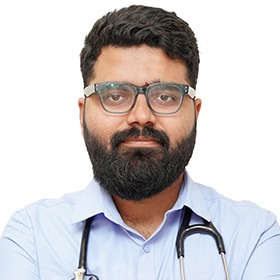Rheumatology
The Center for Rheumatology for Joint Diseases is dedicated to the diagnosis and treatment of all patients with diseases of the joints.Center for Rheumatology is supported by a well equipped Orthopedic department. We also have dedicated physiotherapy department to help the arthritis patients.
Top Rheumatology Doctors in Hyderabad
MD, DM (Rheumatology)
Consultant Rheumatologist
English, Hindi, Telugu, Tamil
13 Yrs
Secunderabad
Day time OPD:
MON - SAT : 09:00 AM - 4:00 PM
Systemic Lupus Erythematosus (Exclusive Lupus Clinic on Every Wednesday), Rheumatoid Arthritis and Pediatric Rheumatology
Management of Musculoskeletal Diseases and Autoimmune Disorders , Rheumatoid Arthritis, Spondyloarthritis, Osteoarthritis, Gout, Arthritis in Children , SLE/LUPUS, Scleroderma, Vasculitis, Dermatomyos...
MD, DM (Clinical Immunology & Rheumatology)
PGI, Chandigarh
PGI, Chandigarh
Consultant Rheumatology
English, Hindi, Tamil, Malayalam
5 Yrs
Hitec City
Day time OPD:
MON - SAT : 9:00 AM - 4:00 PM
Interstitial Lung Disease due to Autoimmune Etiology, Systemic Vasculitis, Lupus Nephritis, Early Rheumatoid Arthritis
Diagnostic and Therapeutic Arthrocentesis and Intra-Articular Injections (Blind or USG Guided), Local Injections for Soft Tissue Rheumatism (Plantar Fasciitis, Achilles Tendinitis, Carpal Tunnel Syndr...
MD (Gen Med), DM (Rheumatology & Clinical Immunology)
Consultant Rheumatologist
English, Telugu, Hindi, Tamil, Odia
5 Yrs
Secunderabad
Day time OPD:
MON - SAT : 09:00 AM - 4:00 PM
Systemic Lupus Erythematosus, Myositis, Scleroderma, Vasculitis, Rheumatoid Arthritis, Spondyloarthropathy
Management of , Musculoskeletal Diseases and Autoimmune Disorders (Adults and Children), Connective Tissue Disorders (SLE, Myositis, Sjogren's Syndrome, Scleroderma), Sarcoidosis, Rheumatoid Ar...
MD, DM Rheumatology, APLAR Fellowship (UK)
Consultant Rheumatologist
English, Hindi, Telugu
17 Yrs
Somajiguda
Day time OPD:
MON - SAT : 09:00 AM - 4:00 PM
Systemic Lupus Erythematosus, Myositis, Interstitial Lung Diseases (CTD related), Rheumatological Emergencies
Management of Musculoskeletal and Autoimmune Diseases (Adults and Children)
MBBS, MD (Gen-Medicine), DM (Clinical Immunology & Rheumatology)
Consultant Rheumatologist
English, Hindi, Bengali, Telugu
3 Yrs
Malakpet
Day time OPD:
MON - SAT : 09:00 AM - 4:00 PM
Myositis- Dermatomyositis, Necrotising Myositis, Systemic Lupus Erythematosus- SLE- Nephritis, Myocarditis, Neuropsychiatric, Vasculitis- Takayasu, PAN/DADA2, ANCA associated vasculitis, Connective Ti...
IPD and OPD patient management-Rheumatoid arthritis, Ankylosing Spondylitis, Spondyloarthritis, Scleroderma, Lupus, CTD-ILD, Psoriatic Arthritis, Vasculitis, Gout, Sjogren Syndrome, Myositis, Soft tis...
FAQ’s
What is pediatric rheumatology?
The field of medicine known as paediatric rheumatology is dedicated to the diagnosis, treatment, and management of rheumatic diseases in children and adolescents, including lupus, vasculitis, and arthritis. This department may even manage co-related symptoms and overcome challenges in managing children with rheumatic conditions.
Is rheumatology curable?
Although there is no permanent cure for rheumatoid conditions, it can be controlled by taking several measures, including early diagnosis to avoid disability, medication for pain, inflammation, or any underlying conditions, supportive therapy to help with daily activities, and lifestyle changes such as stress-reduction techniques.
What does a rheumatology doctor treat?
A rheumatoid doctor treats several conditions even the ones related to joints, muscles, and bones such as rheumatoid arthritis, psoriatic arthritis, gout, lupus, osteoarthritis, scleroderma, vasculitis, and Sjogren’s syndrome.
What are rheumatology symptoms?
The symptoms of rheumatic conditions depend on the type of rheumatic condition, but the most common symptoms are joint pain, stiffness, signs of inflammation in other parts of the body, fatigue, skin rash, and small painless bumps on the body.
What is rheumatology treatment?
The treatment of rheumatology encompasses a diverse array of methods, including medications (such as corticosteroids or anti-rheumatic drugs), therapies (such as physical or occupational therapies), procedures (such as joint injections or cortisol shots), and monitoring to aid in the management of rheumatic and musculoskeletal disorders.
What is the best treatment for rheumatic?
The best treatment for a rheumatic condition depends on the type of condition whether it’s joint, bone, or muscles, the severity of the patient and their age, and the surgeon’s expertise and experience.
What does rheumatology take care of?
Rheumatology is a subfield of medical practice that deals with the diagnosis, prognosis, and management of the joints, muscles, bones, and soft tissues. It takes care of conditions that occur in these regions, including arthritis, gout, lupus, osteoporosis, vasculitis, and tendonitis.







 Appointment
Appointment WhatsApp
WhatsApp Call
Call More
More

